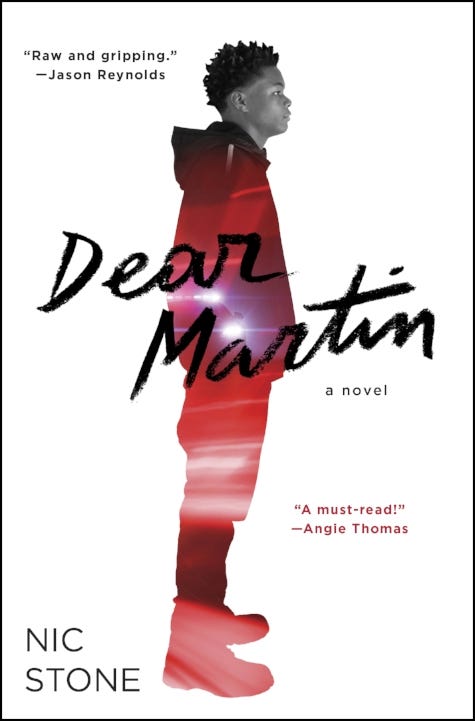Banned Book #5: Dear Martin
“Well anyone born here is a citizen with full rights. There are people who claim certain ‘injustices’ are race-related, but if you ask me, they’re just being divisive.”
A character delivers this line during a class debate in the third chapter of Nic Stone’s Dear Martin, a book which was challenged in Pickens County, South Carolina; after a review by the board, it was restricted to only students with advance parental permission.
The quote itself anticipates the attitude of the book’s challenger in Pickens, who cited its potential to create “racial divisiveness”.
Based on a Freedom of Information Act Request with Pickens Schools, there was only one complaint against Dear Martin, and that complaint aligns closely with the way a small number of individuals and groups have been challenging books like this throughout the state and throughout the country. (The other two books for which Pickens provided copies of challenge forms were The Perks of Being a Wallflower and Stamped, which are also commonly-challenged and included on lists used by book banners.)
Although the novel was published in 2017, the idea that the concept of systemic racism is “divisive” is one of the cornerstones of today’s book challenge legislation, regulations, and rhetoric. Moms for Liberty and related groups have created a well-funded political ecosystem in just a few years based on this idea, and it’s no coincidence that they continually challenge texts like Dear Martin that hold their ideas up for analysis or criticism.

The novel is a frequent target of book-banners, under this general premise that depicting racism in contemporary America is “divisive”. For example, it was banned from Columbia County schools in Georgia in 2019, based on a depiction of “racial tendencies as a negative attribute of society.” According to a post from the University of Chicago, the novel is one of the most frequently challenged in the United States.
Of course Dear Martin is not alone in being challenged because it has the audacity to suggest racism exists in American society. For example, a Freedom of Information Act request revealed book challenges in South Carolina’s Lexington School District 2 based on complaints alleging books like A Good Kind of Trouble might lead to “Racial divide, social justice distraction, BLM armbands, racial unrest, distraction from academics”. (One wonders if the author of that complaint is aware that wearing political armbands at school is a right the Supreme Court has specifically upheld for students since 1969; it was in that year that the famous Tinker v Des Moines case was settled, with the ruling featuring the classic pronouncement that students do not “shed their constitutional rights to freedom of speech or expression at the schoolhouse gate.”)
Every one of the Lexington 2 challenges was made by members of a group called PACE for Lexington 2, which has generally enacted the Moms 4 Liberty playbook: endorsing candidates, reading graphic passages from books in front of children, then complaining about being censored (for sharing passages in front of small children which they maintain shouldn’t be available even to seniors in high school), and bringing challenges that focus mostly on the handful of books that are being heavily targeted across the country.
Even a cursory review of book challenges in Pickens, Lexington, and other parts of South Carolina over the past several years reveals that most of the challenged books deal with race and/ or LGBTQ+ issues, and feature characters of color, transgender characters, or gay characters.
A version of this paid post is available free of charge here, courtesy of the Center for Educator Wellness and Learning/ SCEA.
Keep reading with a 7-day free trial
Subscribe to Other Duties (as assigned) to keep reading this post and get 7 days of free access to the full post archives.



